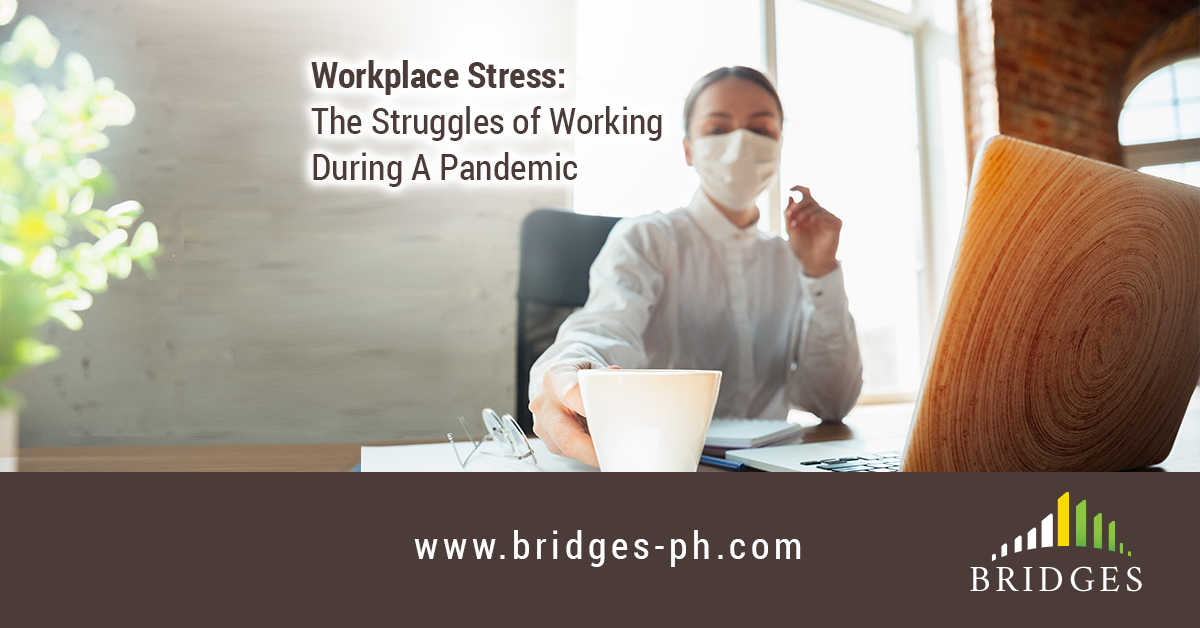
Whether you’re working from home or going to the office, the COVID-19 pandemic has completely turned our daily routines upside down and dramatically changed how we work.
The fear of catching the virus alone can be overwhelming enough, but the sudden and unexpected adjustment in our work arrangements and schedules can also trigger stressors that are just as problematic.
Because of this, when we talk about workplace stress now, it should be in the context of a pandemic, where there are far-reaching health issues that can impact employees and employers alike.
Fear and anxiety
Not all businesses can adopt a work-from-home setup or use technology to digitize its operations, and this can prove to be a big headache for everyone involved.
If you’re an employer, it’s on you to pay for your employees’ tests before asking them to report to work. On top of this, you might also be forced to invest in other solutions that can reduce the risk of the virus, such as disinfectant installations and no-touch policies. These aren’t cheap and can have a fairly sizable effect on your business’s bottom line.
Additional expenses such as these can seem a lot more stressful when you’re already failing to meet financial expectations. By then, you already have to brace for the possibility of retrenching some of your employees. Surely, no employer ever takes pleasure in confronting their staff and telling them that they have to be let go, especially in times like these. But, it’s a reality that you have to face to stay afloat during the ongoing pandemic.
In the same way, employees are worried about job security now more than ever. Moreso because it might be harder to find a new job, with the economy in a downward spiral. Just imagine going to work everyday, thinking, “Am I next on the chopping block?”
Perhaps even worse is that there really isn’t a silver bullet to ensuring your protection against the virus. Yes, testing affords you a bit of peace of mind, but it doesn’t guarantee your safety as someone can test negative today and positive the next day.
Leaving your house, be it for work or for other matters, puts you at risk of contracting the virus. And in the worst case scenario that you do catch it, you can possibly infect people you come into contact with.
Mental and emotional stress
Employees working remotely aren’t spared from workplace stress brought about by the pandemic. Though, they’re much less exposed to the virus, they have other issues to deal with.
If you’re working-from home, it’s easy to feel isolated and lonely when you don’t have anyone to talk to or engage in face-to-face interactions with. It’s a drastic change from the usual office setup, where your work buddies can just be a few desks away. This can be very mentally- and emotionally-taxing and heightens the amount of stress you feel, which can later affect your productivity.
Another problem is that you might have a number of distractions at home, including your children and household chores. See, it’s hard to draw the line between work and other matters when you do it all in one place. When there’s no distinction between the two, you can either work too much or too little.
Getting help
How you cope with all your stresses affects your own health and well-being as well as that of the people around you. But it’s important to know that you and nearly everyone in the world are in uncharted waters right now.
While that makes it sound like we’re all in this together, a quote I read a few months ago argues otherwise. We’re actually “not all in the same boat.” Rather, we’re all in “the same storm.” What does that mean? Well, some people have the luxury to stay at home and not work at all until the situation stabilizes.
Regardless of your current circumstances, however, overcoming challenges has to start with you and you alone. It might be easier to find fault in others and blame them for the difficulties you’re facing, but that certainly won’t improve your situation. What you have to do is acknowledge your problems and accept that help is needed. Once you do, you’ll have a clear idea where or from whom to get help.
At this point, there’s no stopping the pandemic from impacting your financial security. But, as a financial planner, I can offer advice to help you manage and take control of all your assets. It’s not an overnight process, but it’s a step towards preparing you for other crises and other uncertainties.
linkiNG you to opportunities,



